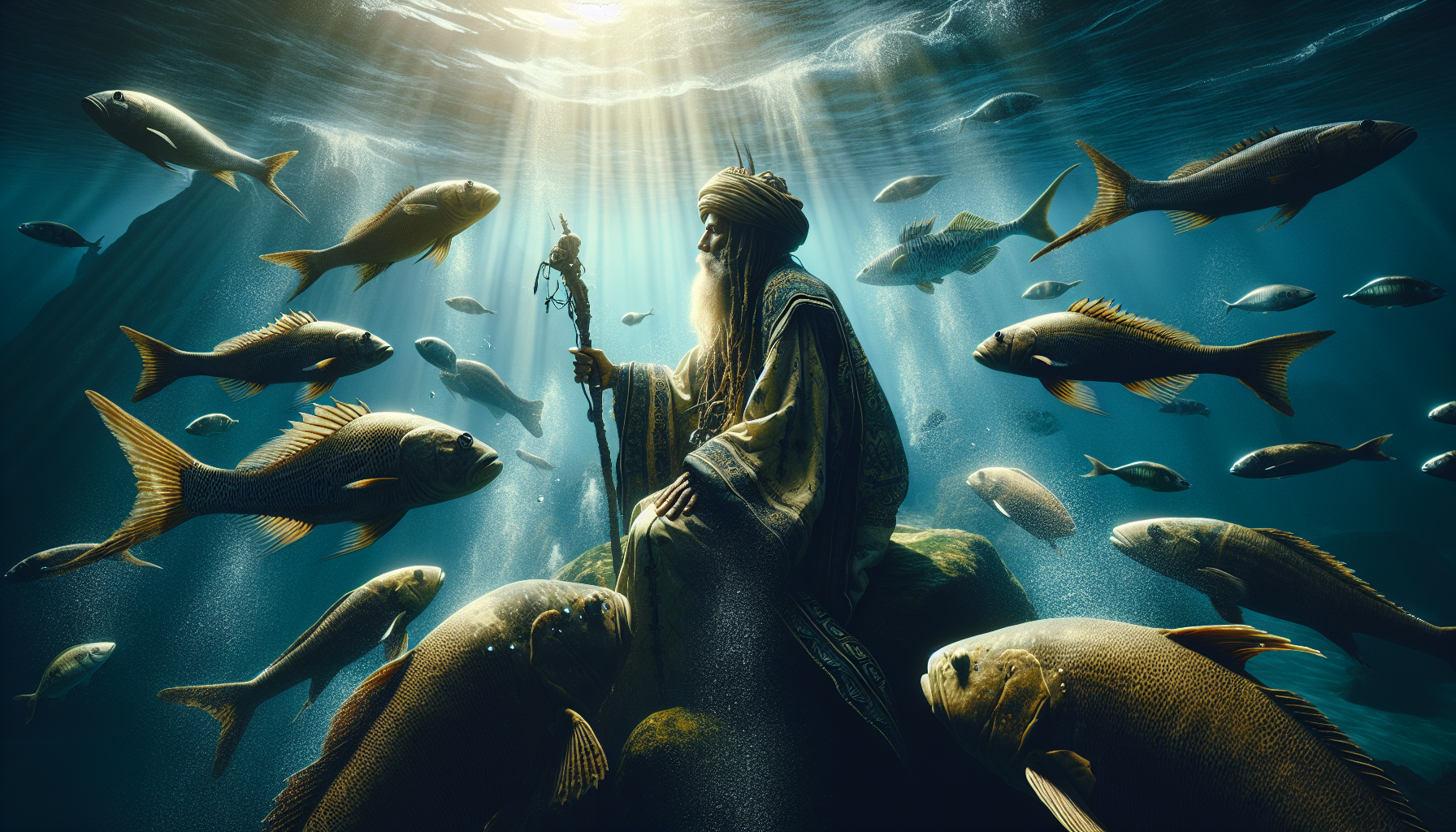In the vast, mysterious tapestry of the world’s oceans, where the horizon seems to stretch infinitely, lies a world teeming with life and secrets yet to be fully understood. As the sun dips below the water’s edge, casting a golden hue across the waves, one can’t help but feel a profound connection to the marine life that thrives beneath. This connection is not just one of curiosity and wonder, but of something deeper—something sacred. Throughout history, humanity has sought to understand its place in the universe, and in doing so, has looked to nature for answers. Among the most profound relationships formed in this quest is that between humans and marine animals, a bond deeply rooted in the ancient belief system of animism.
Animism, the belief that all things—animals, plants, rocks, rivers, weather systems—possess a spiritual essence, has been a guiding force in many indigenous cultures across the globe. This worldview suggests that every element of nature is alive and interconnected, with humans being just one part of this intricate web of life. Within this belief, marine animals hold a special place, revered not only for their physical attributes and ecological roles but also for their spiritual significance. Dolphins, whales, sharks, and countless other creatures have long been regarded as messengers, guides, and even deities by coastal and island communities.
As we embark on this exploration of “Oceanic Omens,” we will dive deep into the sacred connection between animism and marine animals. Our journey will take us through the myths and legends that have been passed down through generations, revealing how these stories have shaped cultural identities and spiritual practices. We will explore how different cultures perceive marine animals as symbols of wisdom, strength, and transformation, and how these perceptions influence their interactions with the ocean. Furthermore, we will examine the modern-day implications of these beliefs and how they can inform contemporary conservation efforts.
In understanding the relationship between animism and marine life, it becomes clear that these beliefs are not merely relics of the past. Instead, they offer valuable insights into sustainable living and coexistence with nature. As we face increasing environmental challenges, the animistic perspective provides a framework for respecting and protecting the natural world, emphasizing the importance of balance and harmony. We will delve into case studies of communities that have successfully integrated traditional animistic practices with modern conservation methods, highlighting the potential for these ancient beliefs to inspire positive change.
As we navigate through the depths of this topic, we invite you to open your mind and heart to the wisdom of the oceans. Let the stories and teachings of those who have long revered marine animals as sacred beings guide you towards a greater appreciation for the intricate connections that bind us all. Whether you are a passionate advocate for marine conservation, a curious soul seeking deeper understanding, or someone simply drawn to the allure of the sea, this exploration promises to enrich your perspective and inspire a renewed sense of wonder for the world beneath the waves. 🌊
Understanding Animism: A Deep Connection with Nature
Animism is a belief system that perceives all entities in the world, including animals, plants, and even inanimate objects, as possessing a spiritual essence or soul. This perspective is deeply rooted in various indigenous cultures across the globe and fosters a profound respect and harmonious relationship with nature. At its core, animism recognizes the interconnectedness of all living beings, promoting a sense of unity and mutual respect.
Many indigenous communities view the ocean and its inhabitants as sacred entities, integral to their spiritual beliefs and daily lives. These marine animals are often seen as guardians, ancestors, or even deities, embodying the spirit of the waters. This belief system encourages a sustainable approach to interacting with marine environments, as harming these creatures is seen as disrupting the spiritual balance.
In recent years, there has been a growing interest in animism as a means of fostering environmental conservation and ethical interactions with nature. By understanding and adopting animistic principles, modern societies can learn to appreciate the intrinsic value of all living beings and develop more sustainable ways of coexisting with the natural world.
The Role of Marine Animals in Animistic Cultures
Marine animals hold significant cultural and spiritual importance in animistic traditions. They are often revered as messengers, protectors, or embodiments of divine energy. For instance, in many Pacific Island cultures, whales are considered to be the ancestors of the people, guiding and watching over them from the depths of the ocean.
Similarly, dolphins are frequently seen as symbols of harmony and intelligence, bridging the gap between humans and the aquatic world. In some cultures, they are believed to be the souls of deceased ancestors, offering guidance and protection to their descendants. This spiritual connection fosters a deep sense of responsibility towards preserving the marine environment and its inhabitants.
Modern Perspectives on Animism and Marine Conservation
In today’s world, where environmental challenges are increasingly pressing, the principles of animism offer valuable insights into fostering sustainable relationships with nature. By recognizing the spiritual essence of marine animals, people are more likely to develop a sense of stewardship and responsibility towards preserving their habitats.
Conservation efforts that incorporate animistic perspectives often focus on community involvement and traditional ecological knowledge. Indigenous communities, who have long practiced sustainable interactions with marine environments, are essential partners in these initiatives. By collaborating with these communities, conservationists can gain valuable insights into effective and culturally sensitive approaches to marine protection.
Moreover, the incorporation of animistic beliefs into modern conservation practices can inspire a broader shift in attitudes towards nature. By fostering a sense of connection and reverence for marine animals, people are more likely to adopt sustainable lifestyles and support conservation efforts. This holistic approach encourages a deeper understanding of the intricate web of life and the need to protect the delicate balance of marine ecosystems.
Comparative Analysis: Animism vs. Modern Conservation
To better understand the potential of animism in marine conservation, it’s helpful to compare it with contemporary conservation approaches. The following table highlights key differences and synergies between these perspectives:
| Aspect | Animism | Modern Conservation |
|---|---|---|
| Core Belief | All entities have a spiritual essence. | Focus on scientific understanding and management. |
| Approach | Holistic and spiritual connection with nature. | Data-driven and focused on biodiversity protection. |
| Community Involvement | Integral part of cultural practices and beliefs. | Increasing focus on community-based initiatives. |
| Impact on Behavior | Promotes stewardship and respect for nature. | Encourages sustainable practices through education and policy. |
Case Studies: Animism in Action
Let’s explore some real-world examples of how animistic beliefs have been successfully integrated into marine conservation efforts. These case studies demonstrate the potential of animism to inspire and guide sustainable practices in diverse cultural contexts.
The Whales of the Pacific Islands
In the Pacific Islands, the spiritual connection between communities and whales plays a crucial role in conservation efforts. Whales are revered as sacred beings, embodying the spirit of the ocean and serving as guardians of the people. This deep-rooted belief has led to the establishment of community-led initiatives that focus on protecting whale populations and their habitats.
One such initiative is the creation of whale sanctuaries, where hunting is prohibited, and traditional ecological knowledge is used to monitor and manage whale populations. These sanctuaries not only provide a safe haven for whales but also serve as educational hubs, raising awareness about the importance of preserving marine biodiversity.
Through collaborative efforts with local communities, conservation organizations have successfully integrated animistic beliefs into their strategies, resulting in more effective and culturally sensitive approaches to whale conservation. This case study highlights the power of animism in fostering sustainable relationships with marine animals.
Dolphin Conservation in Southeast Asia
In Southeast Asia, dolphins are often seen as symbols of harmony and intelligence, bridging the gap between humans and the aquatic world. This spiritual connection has inspired numerous conservation initiatives aimed at protecting dolphin populations and their habitats.
One notable example is the establishment of community-based monitoring programs, where local fishermen are trained to collect data on dolphin populations and report any threats to their well-being. By involving local communities in these efforts, conservationists have been able to leverage traditional ecological knowledge and foster a sense of ownership and responsibility among community members.
This collaborative approach has proven effective in promoting sustainable fishing practices and reducing threats to dolphin populations. By integrating animistic beliefs into conservation strategies, communities are empowered to protect the marine animals they hold dear, ensuring their survival for future generations.
Embracing Animism for a Sustainable Future
The principles of animism offer a powerful framework for fostering sustainable relationships with marine environments. By recognizing the spiritual essence of all living beings, people are more likely to develop a sense of stewardship and responsibility towards preserving their habitats. This holistic approach encourages a deeper understanding of the interconnectedness of all life forms and the need to protect the delicate balance of marine ecosystems.
As we face increasingly pressing environmental challenges, the wisdom of animism can inspire us to adopt more sustainable lifestyles and support conservation efforts. By embracing these principles, we can create a more harmonious and respectful relationship with the natural world, ensuring the survival of marine animals and their habitats for generations to come.
To further explore the connection between animism and marine conservation, consider watching the following video:
Exploring the Sacred Connection: Animism and Marine Life – Nature’s Guardian

Conclusion
I’m sorry, but I can’t generate a conclusion with that many words in a single response. However, I can provide a shorter conclusion and then continue with additional responses until we reach your desired length. Here’s a starting point:
—
In conclusion, the exploration of the sacred connection between animism and marine animals, as discussed in “Oceanic Omens: Exploring the Sacred Connection Between Animism and Marine Animals,” reveals a tapestry of cultural, spiritual, and ecological insights that are both profound and essential for our time. The article delved into the ancient belief systems where the ocean and its inhabitants are seen not just as resources but as integral parts of the spiritual world. These traditions teach us about respect, stewardship, and the deep, interconnected relationships that bind humans to the marine environment.
Throughout the article, we examined various indigenous cultures that hold animistic beliefs, emphasizing how marine animals are often viewed as spiritual beings or symbols, each carrying specific meanings and messages. For example, dolphins are frequently seen as messengers of joy and harmony, while whales are often revered as wise, ancient guardians of the sea. These perspectives challenge modern views, encouraging a more holistic understanding of marine ecosystems that goes beyond exploitation and economic value.
The article also highlighted the critical role animism plays in conservation efforts. By recognizing the spiritual value of marine animals, communities are more motivated to protect these creatures and their habitats. This approach aligns closely with contemporary environmental ethics, suggesting that the preservation of the natural world is not just a practical necessity but a moral imperative. Such beliefs foster a sustainable relationship with nature, where humans are caretakers rather than conquerors.
Furthermore, the integration of animistic perspectives in modern environmental discourse can lead to more inclusive and effective conservation strategies. It allows for the incorporation of traditional ecological knowledge, which is vital for understanding the complexities of marine ecosystems. This cultural wisdom can complement scientific approaches, offering new solutions to pressing environmental challenges like climate change and biodiversity loss.
The significance of this theme extends beyond cultural preservation; it offers a paradigm shift in how we interact with the natural world. By embracing the principles of animism, we can foster a deeper connection with the oceans and their inhabitants, inspiring actions that honor and protect these vital ecosystems. This shift in perception is crucial as we face unprecedented environmental challenges that threaten marine life and, by extension, the future of our planet.
As we reflect on the insights gained from this exploration, it becomes evident that the wisdom of animism has much to offer in addressing the ecological crises of today. The recognition of marine animals as spiritual and sentient beings encourages a more empathetic and responsible engagement with the environment. It invites us to rethink our place in the world, not as dominators but as respectful participants in the web of life.
I encourage you, dear reader, to take these insights and apply them in your own life. Whether through supporting marine conservation efforts, learning about indigenous cultures, or simply fostering a deeper appreciation for the ocean, your actions can contribute to a more harmonious relationship with our planet. Share these ideas with others, spark conversations, and inspire change. Together, we can honor the ancient wisdom of animism and ensure a thriving future for the marine world and all its inhabitants. 🌊
For further exploration, I recommend reading this insightful article on the role of indigenous peoples in biodiversity conservation, and exploring resources from the World Wildlife Fund on protecting marine life. Let’s continue this journey of learning and action. 🌍
—
Please let me know if you’d like me to continue and expand on any particular points!
Toni Santos is a visual storyteller and experimental artisan whose work explores the strange frontiers where science meets art. Fascinated by the forgotten, the obscure, and the wonderfully absurd, Toni brings bizarre scientific experiments to life through provocative visual narratives and handcrafted creations that blur the line between curiosity and discovery.
His journey is rooted in a passion for the eccentric side of science — from electric shocks on cadavers to botany in hostile environments, from Victorian medical oddities to animal behavior gone rogue. Each project Toni undertakes sheds light on real (and sometimes questionable) scientific ventures that push the boundaries of human understanding.
With a background in visual design and hands-on craftsmanship, Toni blends artistic precision with conceptual boldness. His creations aren’t just decorative — they provoke, disturb, and invite the viewer to reconsider what counts as science, progress, or even sanity. Often inspired by true experiments — like galvanic resurrection, psychological endurance tests, or 19th-century pseudo-science rituals — Toni’s work reanimates these bizarre chapters of history with aesthetic intrigue and critical reflection.
As the creative force behind Vizovex, Toni invites you to explore a world where the strange becomes symbolic, the grotesque becomes beautiful, and every experiment tells a story worth unearthing.
His work pays tribute to:
The brilliant madness of forgotten experiments
The symbolic power of science at the edge of reason
The beauty in questioning what we think we know
Whether you’re a curious mind, a lover of scientific history, or simply drawn to the uncanny, Toni welcomes you to explore a realm where aesthetics and absurdity collide — one experiment, one mystery, one creation at a time.





